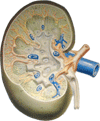Tag
organ donation
-
New tip sheet examines issues surrounding brain death
Are there different levels of death? Are you alive if you’re brain dead but on life support? Many journalists and…

-
Maine journalists wrestle with distinguishing news from promotion in medical crowdfunding
When the health insurance system fails — as it does too often — patients in need frequently turn to crowdfunding…

-
•
Kidney swap connects six in small Mo. town
Joy Robertson of KOLR-Springfield, Mo., tells the story of the coincidences and generosity that led to six residents of Licking,…

-
•
Coincidence leads to remarkable transplant story
Last month, Salt Lake Tribune reporter Heather May was following a family as they waited for the liver donation that…

-
•
Addressing the growing demand for kidneys
Josephine Marcotty of the Minneapolis Star Tribune recently wrote a series addressing the increasing demand for kidneys, a need spurred…

-
•
‘Kidney pirates,’ organized crime and health care
In a recent episode of HDNet’s Dan Rather reports, the journalist criss-crossed the globe alongside an academic/activist and others trying…

-
•
KQED profiles those who live with disease, injury
This month’s edition of Health Dialogues, part of KQED’s California Report, focuses on living with disease. In the report, KQED…

-
•
Man claims he sold kidney for $20,000
Associated Press reporters Carla K. Johnson and Adam Goldman report on a man who says he was paid $20,000 for…

-
Organ network looks to address regional disparities
American Medical News‘ Kevin O’Reilly writes that, spurred on by attention paid to Apple boss Steve Jobs’ trip to Tennessee…


